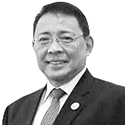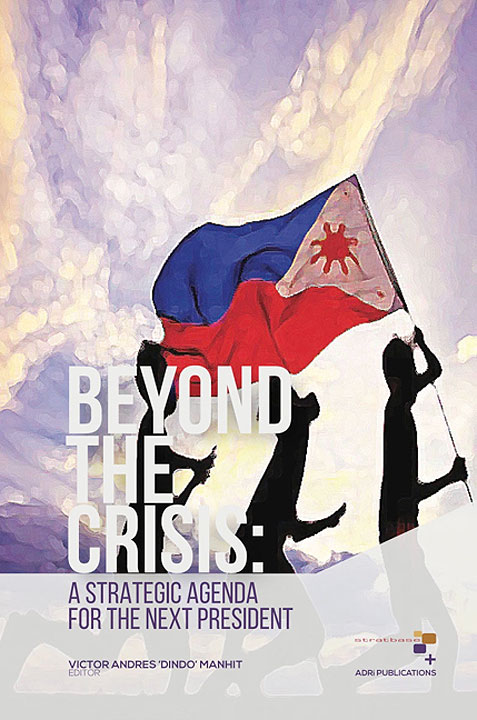
Signs And Wonders
By Diwa C. Guinigundo
 The question could not have been more appropriate, and it was Boo Chanco of The Philippine Star who asked it last Wednesday: “Where’s the beef?” It was not one of those questions that Marcos’ fanatics should lambast in social media. It was an honest ordinary citizen’s query on how do we move from here, and in the next six years. Where’s the plan?
The question could not have been more appropriate, and it was Boo Chanco of The Philippine Star who asked it last Wednesday: “Where’s the beef?” It was not one of those questions that Marcos’ fanatics should lambast in social media. It was an honest ordinary citizen’s query on how do we move from here, and in the next six years. Where’s the plan?
Our own quick survey, and this is not science, of columnists and features, here and abroad in the few days before and after the May 9 election would tell us that the presumptive president has to hurdle the legitimacy issue considering his disqualification cases now in the Supreme Court. He is also challenged by the need to quickly organize his cabinet, particularly his economic team. A roadmap is absolutely necessary if only to offer civil society some kind of forward guidance, in central banking parlance.
For the new administration will be navigating treacherous waters. The COVID-19 pandemic has left us with lives and hopes lost. We also sustained some economic collateral damage, not the least of which was the deepest recession we sustained in 2020, and economic scars in the labor market. Inflation pressures now threaten consumer spending and, unless promptly arrested, at least a reversal of economic growth might be triggered. Our debt levels are uncomfortably high. Fundamental questions have been asked about the future of the country’s foreign policy in a more globalized world.
Doubtless, there could arise a policy vacuum and there is little time to avoid the disconnect between the “unity” theme of Marcos’ campaign and what he could offer in terms of concrete strategies to bring everyone into the political and economic mainstream.
Providing strategic thoughts in a post-crisis period is the most substantive public good value of Stratbase ADR Institute’s latest book, Beyond the Crisis: A Strategic Agenda for the Next President. It is an interesting collection of policy papers on three agenda items namely, foreign and security agenda, economic and development agenda, and governance agenda.
Six articles put flesh and blood to foreign and security agenda proposed for consideration by the next administration. Victor Andres Manhit (“A Responsive and Strategic Policy Outlook in an Interconnected and Multipolar World”) stresses the relevance of a values-based governance as multilateral initiatives arise. He also argues for a “future-oriented, responsive, and strategic Philippine foreign policy” that should entail the configuration of the country’s national interest against the backdrop of uncertainties about the current international order.
This general formulation is supported by Renato Cruz de Castro (“A National Security Strategy for the 17th Philippine President: The Case for a Limited Balancing Strategy”), Richard Heydarian (“The Great Cauldron: China, US and the New Cold War in the Indo-Pacific”), Chester Cabalza (“Philippine Civil and Maritime Security: Transforming from Archipelagic to Maritime Power”), Mely Caballero-Anthony (“Non-Traditional Security Threats to Peace and Security in the Indo-Pacific”), and Toby Monsod (“Accelerating Resilience and Climate Change Adaptation: Strengthening the Philippines’ Contribution to the Global Decarbonization Agenda”).
On economic and development agenda, seven articles covered the various aspects of the macroeconomy. Your’s truly (“Philippines: Pursuing an Investment-Led, More Sustainable Economic Growth”) covers the general economy, arguing that the economic scarring due to the pandemic may be the persistent challenge in the future. Policy and structural reforms in the last 30 years would be extremely helpful. I promote the view that investment can fuel a resilient strategy for economic growth.
Various aspects are covered by the other six articles by Charlotte Justine Diokno-Sicat (“Building Better Towards Inclusive Growth with Innovative Public Sector Governance”), Vicente Paqueo and Michael Abrigo (“Issues for the Next Administration’s Development Agenda: On Human Capital and Labor Markets”), Magdalena Barcelon, Katharina Anna Berza and Eleanor Jara (“Beyond Health Measures: Towards a Genuine People’s Health Agenda”), Zy-za Nadine Suzara (“Rethinking Public Spending Priorities Towards Inclusive Recovery”), Sherwin Ona (“Digitalization Agenda 2022: Towards a Resilient Philippines Through Digital Transformation an Inclusion”), and Carlos Primo David (“Improving the Philippine Agriculture Sector by Establishing Food Production Areas”).
Finally, on governance agenda, three articles build it up. Francisco Magno (“Governance Agenda for Development in a Post-COVID-19 Philippines”) contextualizes his paper on the country’s performance against the Worldwide Governance Indicators that cover six metrics including voice and accountability, regulatory quality and control of corruption. Consistent with the Constitution, his paper calls for the pursuit of reforms and innovation that is anchored on building strong institutions that encourage people’s greater participation.
Ronald Mendoza (“Reducing Inequality in the Philippines: Rationale and Reform Options”) considers income inequality to be a priority because it can weaken social cohesion, contribute to political instability and unsustainable growth. Rizal Buendia (“Lessons and Prospects in Philippine Political Governance: Cutting Across Regimes from Marcos to Duterte”) assesses seven presidencies in terms of various indicators of governance like transparency and accountability as well as electoral politics.
Beyond the Crisis… goes beyond the analysis of the dynamics of the past and the trajectory of what is happening today. Under each category and author, specific recommendations are offered to civil society, that the new administration would consider them and the nongovernment organizations (NGOs) to take up the new government on what it pledged to attain: unity, price stability, growth and more jobs.
Space makes it imperative for us to be parsimonious, and indeed there is no substitute to grabbing a copy and digesting the recommendations. At best, we can do an unjust compression of a great tome of scholarship.
Manhit proposes a clear, cohesive and consistent foreign policy direction, one that prioritizes the Philippines’ national interest in politics and security, economic diplomacy and welfare of Filipinos.
De Castro would like a new National Security Strategy based on the 2016 Arbitral Ruling, incorporating non-traditional security priorities like public health and modernization of the armed forces.
Heydarian proceeds from a strong position on upholding the Philippines’ sovereign rights over the West Philippine Sea and argues for revisiting and upgrading the country’s existing security arrangements.
Cabalza recommends strategic approaches to addressing any grey zone in protecting Philippine territory, deterring security threats through, among others, professionalization of the military and strengthening naval diplomacy.
Caballero-Anthony is for leveraging on risk assessment and management processes to support national security policy as well as establishing a resilient response system especially on food security.
Monsod proposes a shift away from a greenhouse gas inventory-centric approach in favor of climate change adaptation, and proposes to build robust community ownership for climate action.
I propose executive and legislative policies to promote investment, focus on health and economic effects of the pandemic, and a refocus on growth-related governance issues like poverty, inequality and corruption.
Diokno-Sicat is for strategizing fiscal consolidation, increasing the participation of local government units in economic recovery efforts, and implementing institutional and governance innovations in the public sector.
Paqueo and Abrigo propose to recalibrate the education agenda to promote quality education in sciences and technology for global competitiveness, and prioritize labor productivity growth through upskilling, among others.
Barcelon, Berza, and Jara are for developing a free, comprehensive and progressive national healthcare system, strengthening a community-based public health system, and encouraging the growth of the local pharmaceutical industry.
Suzara would like a rethink of budget priorities to strengthen the health system and attain inclusive economic recovery, as well as to re-establish transparency and accountability in budget disbursement.
Ona suggests a roadmap to achieve digital transformation, address the digital divide, lay down digital infrastructure, and create innovation hubs — complete with appropriate legislation on digital governance and cyber defense.
David recommends the promotion of climate-resilient agriculture, crop overproduction and food processing through some purchasing agreement, land consolidation strategies, and social enterprise farms.
Magno champions a comprehensive approach on corruption prevention, interoperability of delivery of public services through e-governance and anchoring of governance agenda on Sustainable Development Goals.
Mendoza recognizes that political and electoral reforms are crucial, proposes to reduce inequality to achieve political stability, crisis resilience, and sustained growth as well as strengthen the implementation of key inequality-related laws.
Buendia proposes to strengthen the multi-party system to achieve proportional representation of political parties based on their platforms reflecting principles and ideologies, as well as to shift governance efforts from problems to needs.
What is obvious from the substance of the book is that the burning issues that beg yesterday’s government actions are all there. Some people would argue that the book places greater emphasis on what is present than what is absent. It is for the reason of completeness that this volume decided to cover issues on good governance, fighting corruption, mitigating economic scars, upholding our sovereign rights on Philippine territories, insisting on climate resiliency, community ownership, addressing poverty and inequality, fiscal consolidation, quality education, progressive public health system and digital transformation.
It is tempting to say that if one is against these imperatives, he is also against the welfare and interest of the Filipino people. Go and grab the book during its launch today, May 20 at 10 a.m. to noon, at Max’s Restaurant, Quezon Memorial Circle.
Starting next week, this columnist will take a break for four weeks to join the family in the LLM graduation of his two sons from Georgetown.
Diwa C. Guinigundo is the former deputy governor for the Monetary and Economics Sector, the Bangko Sentral ng Pilipinas (BSP). He served the BSP for 41 years. In 2001-2003, he was alternate executive director at the International Monetary Fund in Washington, DC. He is the senior pastor of the Fullness of Christ International Ministries in Mandaluyong.